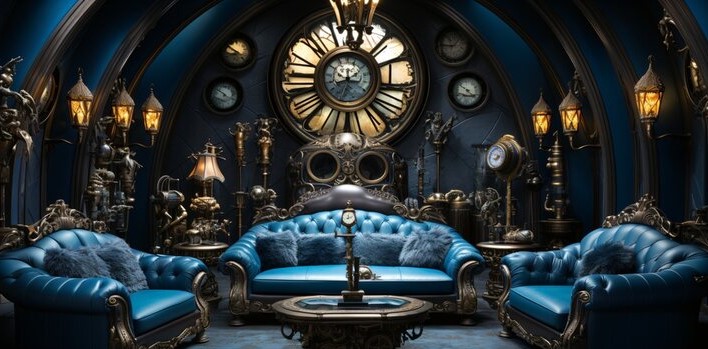
Introduction: The Allure of Steampunk-Style Home Décor
What is steampunk style home décor?
How steampunk merges history with futuristic design
Why steampunk home décor is gaining popularity in modern interiors
The Origins of Steampunk Aesthetics
The history behind steampunk and its Victorian roots
How industrial revolution aesthetics shaped steampunk style
Steampunk in literature, film, and pop culture
Key Elements of Steampunk Style Home Décor
Industrial materials: brass, copper, and iron
The influence of vintage technology and machinery
Intricate clockwork and gears as design elements
Mixing vintage with futuristic elements for a unique aesthetic
Color Palettes in Steampunk Style Home Décor
Rich, warm tones: browns, golds, and coppers
Muted hues and dark accents for an antique feel
Adding pops of color with metallic finishes
How to balance light and dark in steampunk spaces
Furniture: Blending Old-World Charm with Industrial Edge
Vintage-inspired furniture with a modern twist
The role of distressed and weathered wood in steampunk design
Industrial-style furniture: metal frames, leather seating, and more
Repurposed and upcycled furniture for an authentic look
Lighting in Steampunk Style Home Décor
The importance of vintage and industrial lighting
How Edison bulbs and exposed light fixtures define steampunk spaces
Creating atmospheric lighting with lanterns and chandeliers
DIY lighting ideas for a steampunk-inspired home
Steampunk-Inspired Wall Art and Décor
The magic of gears, cogs, and mechanical artwork
Using framed blueprints, vintage maps, and antique mirrors
Creating a steampunk gallery wall with eclectic art
Incorporating steampunk clocks for both style and function
Textiles and Fabrics: The Comfort of Steampunk Design
Velvets, leathers, and tweeds for a luxurious touch
Using intricate patterns like damask and brocade
Cushions and throws to add warmth to steampunk rooms
Incorporating lace and metal accents in textiles
Steampunk Style Home Décor in the Living Room
How to create a cozy yet industrial living room
The role of statement furniture and lighting in the living room \
Decorative accessories for a steampunk vibe: clocks, lamps, and books
Integrating modern technology into a steampunk-inspired space
Steampunk Style Home Décor in the Bedroom
Creating a Victorian-inspired bedroom with steampunk charm
How to balance comfort and industrial aesthetics in the bedroom
Steampunk beds: combining wood, metal, and intricate details
Unique steampunk-inspired bedding and textiles
Steampunk Style Home Décor in the Kitchen
Industrial kitchen elements: exposed shelving, stainless steel
Repurposed and vintage kitchen tools for a steampunk feel
Creative ways to incorporate steampunk accessories in the kitchen
Using brass fixtures and retro appliances in a modern kitchen
Steampunk Style Home Décor in the Bathroom
Transforming the bathroom into an industrial oasis
The role of copper and bronze in steampunk bathroom fixtures
How to incorporate vintage mirrors and industrial lighting
Creating a steampunk shower or bath experience with rich textures
Accessorizing with Steampunk Style Home Décor
Unique steampunk accessories: clocks, compasses, and goggles
How to integrate metal and leather accents throughout the home
Decorating with steampunk curiosities like gears and vintage tech
Repurposing old machines into decorative objects
Incorporating Steampunk Style Into Small Spaces
How to embrace the steampunk aesthetic in apartments and small rooms
Creative storage solutions in steampunk-style spaces
Using mirrors and lighting to create a sense of space
Maximizing functionality with industrial-style furniture in compact rooms
DIY Projects for Steampunk Home Décor
Repurposing vintage items into steampunk creations
Building your own steampunk-style lighting fixtures
How to create steampunk furniture on a budget
Crafting steampunk wall art with gears and reclaimed materials
Steampunk Style Home Décor on a Budget
Finding affordable steampunk décor pieces
Thrift store treasures: finding vintage pieces for a steampunk home
DIY upgrades: turning old furniture into steampunk masterpieces
How to achieve a steampunk look without spending a fortune
Mixing Steampunk with Other Interior Design Styles
How to blend steampunk with industrial décor
Integrating vintage and retro elements into your steampunk space
Combining steampunk with modern and minimalist design
Steampunk and bohemian style: mixing the past with the free-spirited
Sustainability in Steampunk Style Home Décor
Repurposing materials for eco-friendly steampunk design
How to incorporate recycled metal, wood, and glass into your home
Supporting sustainable artisans for unique steampunk creations
The role of upcycling in steampunk-inspired home décor
Steampunk Décor in Different Rooms of the House
Creating a steampunk entryway: first impressions matter
How to design a steampunk-inspired dining room
Steampunk-style home office: combining function and fantasy
Steampunk-inspired libraries and reading rooms
Steampunk in Outdoor and Garden Décor
Bringing steampunk into your garden or patio
Steampunk-style garden furniture: blending old-world charm with functionality
Using industrial materials for outdoor accents and lighting
How to decorate your garden with steampunk sculptures and elements
The Future of Steampunk Style Home Décor
How steampunk will evolve in modern interior design
Embracing steampunk tech: futuristic gadgets and home automation
The role of 3D printing and technology in steampunk-inspired décor
Steampunk as a sustainable design choice for future interiors
Steampunk Style Décor for Seasonal Changes
Adapting your steampunk décor for different seasons
Fall and winter: embracing warmth with steampunk textiles and lighting
Spring and summer: bringing a touch of nature into steampunk spaces
Holiday decorations with a steampunk twist
Creating a Steampunk Style Home Décor Vision Board
Curating your dream steampunk space
What to include in your vision board to stay on track
Finding inspiration through books, movies, and online platforms
Tips for translating your vision board into reality
Common Mistakes to Avoid in Steampunk Style Home Décor
Overcrowding the space with too many gears and metals
How to avoid a cluttered look in a steampunk-inspired room
Balancing vintage and modern elements for a cohesive aesthetic
Not considering functionality in steampunk designs
Conclusion: Bringing Steampunk Style Home Décor to Life
Embracing the beauty of steampunk in your home
How to blend vintage nostalgia with modern elegance
Creating a personalized, dynamic steampunk-inspired space
Final tips for achieving the perfect steampunk aesthetic
What is Steampunk Style Home Décor?
Steampunk-style home décor is a fascinating blend of Victorian elegance and Industrial Revolution-inspired aesthetics. It celebrates mechanical ingenuity, combining vintage technological elements and a fantastical, future-forward interpretation of the past.
The hallmark of steampunk style is its ability to merge the old with the new– gritty, metal machinery meets polished elegance in an environment that evokes a sense of adventure and wonder. From exposed gears and cogs to antique furniture and soft leather finishes, steampunk transforms any space into a visual narrative of innovation, nostalgia, and industrial beauty.
How Steampunk Merges History with Futuristic Design
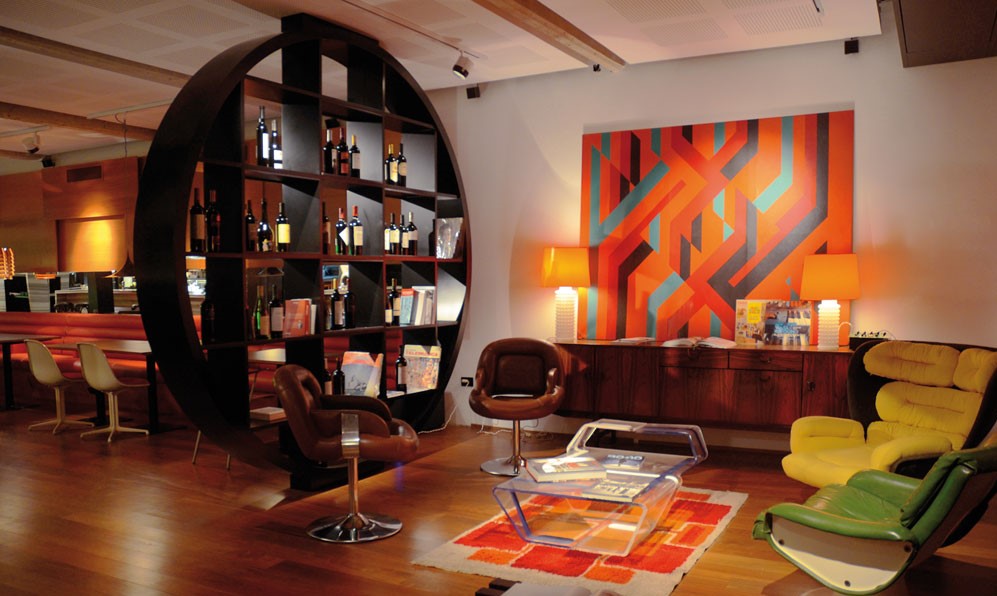
At the heart of steampunk design lies the tension between historical influences and futuristic imagination. Rooted in the Victorian era, steampunk décor celebrates the intricacies of the past– brass mechanisms, steam-powered machines, and an appreciation for craftsmanship– while also envisioning a world where technology is driven by steam, clockwork, and mechanical contraptions. It imagines an alternate history where the Industrial Revolution was far more fantastical and advanced than it was in reality. The result is a stunning blend of antiquated elegance and forward-thinking design.
Why Steampunk Home Décor is Gaining Popularity in Modern Interiors
In a world filled with sleek, minimalist spaces, steampunk home décor offers something profoundly different: warmth, depth, and personality. Its allure lies in the nostalgia it evokes, mixed with the excitement of a world imagined in the past but tinged with modern-day innovation. In a time when many people crave authenticity and connection to history, steampunk provides a space to indulge in both. Its eccentric charm invites curiosity and conversation, making it a unique and appealing choice for those who want their home to stand out, tell a story, and feel like an adventure.
The Origins of Steampunk Aesthetics
The History Behind Steampunk and Its Victorian Roots
Steampunk emerged as a subgenre of science fiction in the 1980s. Still, its roots can be traced back to the heart of the Victorian era. This was when technology was advancing rapidly, with the steam engine revolutionizing industry, transportation, and daily life. The fascination with this technology and the ornate and decorative design trends of the period laid the foundation for what would later become steampunk. Victorian society’s obsession with exploration, innovation, and machinery is embodied in the intricate details, brass embellishments, and mechanical motifs that characterize steampunk décor.
How Industrial Revolution Aesthetics Shaped Steampunk Style
The Industrial Revolution was a turning point in human history, marked by rapid technological advancements and the rise of factories and mass production. It was a time when steam power dominated, and cities began to transform with the rise of iron, steel, and new manufacturing techniques. Steampunk reimagines these industrial elements through a romanticized, artistic lens. Materials like brass, copper, and wrought iron, often associated with the era’s industrial machines, become the backbone of steampunk aesthetics. The juxtaposition of these raw materials with Victorian-style design– complete with intricate details and decorative flourishes– creates a unique atmosphere that is both nostalgic and daringly futuristic.
Steampunk in Literature, Film, and Pop Culture
Steampunk has long been a favorite of writers and filmmakers who enjoy exploring alternate histories. Early works by authors like Jules Verne and H.G. Wells, whose tales were filled with fantastical machinery and futuristic inventions, laid the groundwork for the genre. In cinema, films like The League of Extraordinary Gentlemen and Wild West brought the aesthetic to the big screen, showcasing the marriage of Victorian sensibilities with outlandish technological advancements. The movement has since found its way into pop culture, from cosplay to video games, where fans embrace the steampunk aesthetic as a lifestyle and a statement of creative freedom.
Key Elements of Steampunk Style Home Décor
Industrial Materials: Brass, Copper, and Iron
One of the defining features of steampunk décor is its use of industrial materials, especially metals like brass, copper, and iron. These materials are often left in raw or lightly aged states to enhance the vintage, industrial feel. Brass and copper, with their warm, golden hues, bring a touch of opulence to the otherwise gritty aesthetic, while iron and steel provide a rugged, industrial edge. These metals are used in everything from lighting fixtures to furniture, creating a cohesive, mechanical atmosphere characteristic of steampunk spaces.
The Influence of Vintage Technology and Machinery
Steampunk décor embraces the beauty of vintage technology, often incorporating elements such as gears, cogs, and clockwork into furniture and wall art. These mechanical pieces become central decorative elements, providing aesthetic value and a sense of history and craftsmanship. The industrial machines of the past, with their intricate and functional design, are celebrated in steampunk, reminding us of a time when technology was complex and beautifully constructed.
Intricate Clockwork and Gears as Design Elements
Gears, cogs, and clockwork mechanisms are ubiquitous in steampunk home décor. These mechanical elements represent the Victorian era’s technological advancements and serve as functional and ornamental pieces in steampunk interiors. These moving parts bring dynamism to a room, whether incorporated into lighting fixtures, furniture, or wall art. The intricate craftsmanship of gears and clockwork symbolizes the steampunk aesthetics’ love of mechanical precision and elaborate design.
Mixing Vintage with Futuristic Elements for a Unique Aesthetic
Steampunk is defined by its ability to blend the old with the new in a unique way. While vintage technology and Victorian design elements anchor the aesthetic, there is also room for futuristic concepts– imagined through a lens of steam-powered mechanics and clockwork innovation. This marriage of eras allows for a dynamic, imaginative aesthetic that feels familiar and groundbreaking. The juxtaposition of old-world charm and futuristic design gives steampunk its signature boldness and originality.
Color Palettes in Steampunk Style Home Décor
Rich, Warm Tones: Browns, Golds, and Coppers
The color palette in steampunk home décor is rich and inviting, featuring deep browns, golden yellows, and warm coppers. These tones evoke the look of aged brass, leather, and wood, enhancing the vintage feel of the space. The warmth of these hues creates an inviting and comfortable atmosphere, balancing the raw industrial elements with a sense of intimacy and elegance. These colors also reflect the beauty of machinery, where aged metals and patina play a starring role in the design.
Muted Hues and Dark Accents for an Antique Feel
To complement the warmth of metallic tones, steampunk often incorporates muted, darker shades such as charcoal, deep greens, and rusty reds. These colors evoke the patina of time-worn objects and help to create a sense of antiquity and history within the space. Darker accents, such as black, navy, or mahogany, also anchor the design, adding depth and a touch of sophistication to the overall décor.
Adding Pops of Color with Metallic Finishes
While steampunk décor embraces earthy tones, it also thrives on pops of metallic finishes in gold, silver, and copper. These shimmering touches bring contrast and visual intrigue, highlighting key design elements like light fixtures or mechanical components. The metallic accents catch the light, creating a dynamic effect that keeps the décor from feeling too heavy or overwhelming and provides a sense of glamour amid the industrial aesthetic.
How to Balance Light and Dark in Steampunk Spaces
One of the key challenges in designing a steampunk-inspired space is balancing the dark, heavy tones with lighter metallic finishes and textures. Strategic lighting plays an essential role in achieving this balance– using Edison bulbs or exposed light fixtures can introduce warmth and brightness into the room. Mirrors and glass elements can also reflect light, helping to offset the darker hues and create a well-lit, balanced atmosphere.
Furniture: Blending Old-World Charm with Industrial Edge
Vintage-Inspired Furniture with a Modern Twist
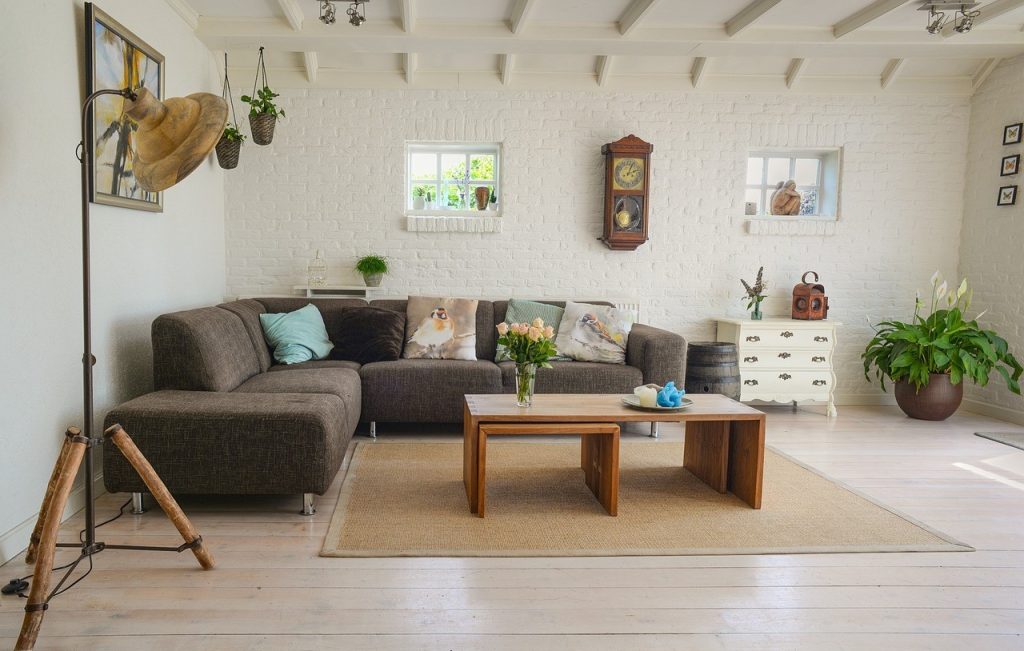
Steampunk furniture often takes cues from Victorian-era designs, blending them with the industrial and mechanical elements of the period. Vintage-inspired pieces, like tufted leather chairs or antique wooden tables, are given a modern twist by adding metal frames or steampunk-inspired embellishments. The resulting furniture pieces feel nostalgic and forward-thinking, with intricate detailing and a sturdy, functional design.
The Role of Distressed and Weathered Wood in Steampunk Design
Wood plays a significant role in steampunk style, with distressed or weathered finishes creating a rustic, vintage appeal. Dark-stained woods, reclaimed materials, and rough-hewn textures evoke a sense of craftsmanship and timelessness. The rich grain of wood, paired with industrial metal elements, creates a striking contrast that gives depth and personality to the space.
Industrial-Style Furniture: Metal Frames, Leather Seating, and More
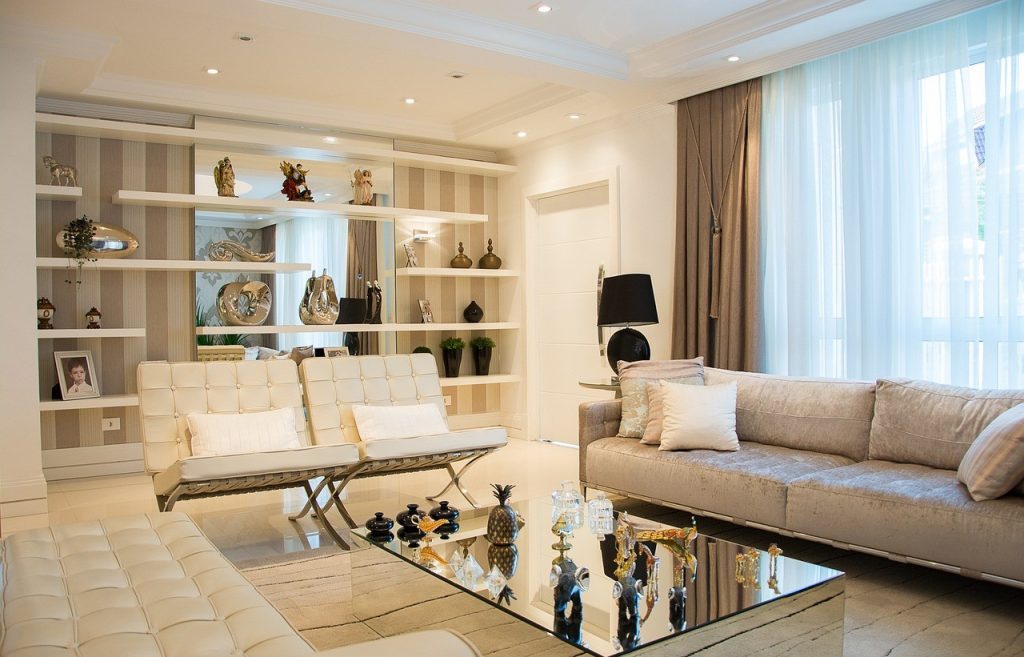
Industrial-style furniture is a staple in steampunk design. Furniture with metal frames, like shelving units or chairs, brings an industrial edge to the space, while leather seating adds a layer of comfort and luxury. The combination of metal and leather creates a striking contrast, and these materials often feature weathered or aged finishes that give them a vintage look. Industrial-style furniture is a functional and decorative element, whether it’s a metal desk, a leather armchair, or a wrought-iron coffee table.
Repurposed and Upcycled Furniture for an Authentic Look
Repurposing and upcycling old furniture is key to creating an authentic steampunk space. Vintage furniture finds can be transformed into something entirely new by adding metal components, restoring wood finishes, or incorporating mechanical details like gears or rivets. This process gives new life to old items and aligns with the steampunk ethos of reimagining the past with a fresh perspective.
What is Steampunk Style Home Décor?
Steampunk-style home décor is a fascinating blend of Victorian elegance and Industrial Revolution-inspired aesthetics. It celebrates mechanical ingenuity, combining vintage technological elements and a fantastical, future-forward interpretation of the past. The hallmark of steampunk style is its ability to merge the old with the new– gritty, metal machinery meets polished elegance in an environment that evokes a sense of adventure and wonder. From exposed gears and cogs to antique furniture and soft leather finishes, steampunk transforms any space into a visual narrative of innovation, nostalgia, and industrial beauty.
How Steampunk Merges History with Futuristic Design
At the heart of steampunk design lies the tension between historical influences and futuristic imagination. Rooted in the Victorian era, steampunk décor celebrates the intricacies of the past– brass mechanisms, steam-powered machines, and an appreciation for craftsmanship– while also envisioning a world where technology is driven by steam, clockwork, and mechanical contraptions. It imagines an alternate history where the Industrial Revolution was far more fantastical and advanced than it was in reality. The result is a stunning blend of antiquated elegance and forward-thinking design.
Why Steampunk Home Décor is Gaining Popularity in Modern Interiors
In a world filled with sleek, minimalist spaces, steampunk home décor offers something profoundly different: warmth, depth, and personality. Its allure lies in the nostalgia it evokes, mixed with the excitement of a world imagined in the past but tinged with modern-day innovation. In a time when many people crave authenticity and connection to history, steampunk provides a space to indulge in both. Its eccentric charm invites curiosity and conversation, making it a unique and appealing choice for those who want their home to stand out, tell a story, and feel like an adventure.
The Origins of Steampunk Aesthetics
The History Behind Steampunk and Its Victorian Roots
Steampunk emerged as a subgenre of science fiction in the 1980s. Still, its roots can be traced back to the heart of the Victorian era. This was when technology was advancing rapidly, with the steam engine revolutionizing industry, transportation, and daily life. The fascination with this technology and the ornate and decorative design trends of the period laid the foundation for what would later become steampunk. Victorian society’s obsession with exploration, innovation, and machinery is embodied in the intricate details, brass embellishments, and mechanical motifs that characterize steampunk décor.
How Industrial Revolution Aesthetics Shaped Steampunk Style
The Industrial Revolution was a turning point in human history, marked by rapid technological advancements and the rise of factories and mass production. It was a time when steam power dominated, and cities began to transform with the rise of iron, steel, and new manufacturing techniques. Steampunk reimagines these industrial elements through a romanticized, artistic lens. Materials like brass, copper, and wrought iron, often associated with the era’s industrial machines, become the backbone of steampunk aesthetics. The juxtaposition of these raw materials with Victorian-style design– complete with intricate details and decorative flourishes– creates a unique atmosphere that is both nostalgic and daringly futuristic.
Steampunk in Literature, Film, and Pop Culture
Steampunk has long been a favorite of writers and filmmakers who enjoy exploring alternate histories. Early works by authors like Jules Verne and H.G. Wells, whose tales were filled with fantastical machinery and futuristic inventions, laid the groundwork for the genre. In cinema, films like The League of Extraordinary Gentlemen and Wild West brought the aesthetic to the big screen, showcasing the marriage of Victorian sensibilities with outlandish technological advancements. The movement has since found its way into pop culture, from cosplay to video games, where fans embrace the steampunk aesthetic as a lifestyle and a statement of creative freedom.
Key Elements of Steampunk Style Home Décor
Industrial Materials: Brass, Copper, and Iron
One of the defining features of steampunk décor is its use of industrial materials, especially metals like brass, copper, and iron. These materials are often left in raw or lightly aged states to enhance the vintage, industrial feel. Brass and copper, with their warm, golden hues, bring a touch of opulence to the otherwise gritty aesthetic, while iron and steel provide a rugged, industrial edge. These metals are used in everything from lighting fixtures to furniture, creating a cohesive, mechanical atmosphere characteristic of steampunk spaces.
The Influence of Vintage Technology and Machinery
Steampunk décor embraces the beauty of vintage technology, often incorporating elements such as gears, cogs, and clockwork into furniture and wall art. These mechanical pieces become central decorative elements, providing aesthetic value and a sense of history and craftsmanship. The industrial machines of the past, with their intricate and functional design, are celebrated in steampunk, reminding us of a time when technology was complex and beautifully constructed.
Intricate Clockwork and Gears as Design Elements
Gears, cogs, and clockwork mechanisms are ubiquitous in steampunk home décor. These mechanical elements represent the Victorian era’s technological advancements and serve as functional and ornamental pieces in steampunk interiors. These moving parts bring dynamism to a room, whether incorporated into lighting fixtures, furniture, or wall art. The intricate craftsmanship of gears and clockwork symbolizes the steampunk aesthetics’ love of mechanical precision and elaborate design.
Mixing Vintage with Futuristic Elements for a Unique Aesthetic
Steampunk is defined by its ability to blend the old with the new in a unique way. While vintage technology and Victorian design elements anchor the aesthetic, there is also room for futuristic concepts– imagined through a lens of steam-powered mechanics and clockwork innovation. This marriage of eras allows for a dynamic, imaginative aesthetic that feels familiar and groundbreaking. The juxtaposition of old-world charm and futuristic design gives steampunk its signature boldness and originality.
Color Palettes in Steampunk Style Home Décor
Rich, Warm Tones: Browns, Golds, and Coppers
The color palette in steampunk home décor is rich and inviting, featuring deep browns, golden yellows, and warm coppers. These tones evoke the look of aged brass, leather, and wood, enhancing the vintage feel of the space. The warmth of these hues creates an inviting and comfortable atmosphere, balancing the raw industrial elements with a sense of intimacy and elegance. These colors also reflect the beauty of machinery, where aged metals and patina play a starring role in the design.
Muted Hues and Dark Accents for an Antique Feel
To complement the warmth of metallic tones, steampunk often incorporates muted, darker shades such as charcoal, deep greens, and rusty reds. These colors evoke the patina of time-worn objects and help to create a sense of antiquity and history within the space. Darker accents, such as black, navy, or mahogany, also anchor the design, adding depth and a touch of sophistication to the overall décor.
Adding Pops of Color with Metallic Finishes
While steampunk décor embraces earthy tones, it also thrives on pops of metallic finishes in gold, silver, and copper. These shimmering touches bring contrast and visual intrigue, highlighting key design elements like light fixtures or mechanical components. The metallic accents catch the light, creating a dynamic effect that keeps the décor from feeling too heavy or overwhelming and provides a sense of glamour amid the industrial aesthetic.
How to Balance Light and Dark in Steampunk Spaces
One of the key challenges in designing a steampunk-inspired space is balancing the dark, heavy tones with lighter metallic finishes and textures. Strategic lighting plays an essential role in achieving this balance– using Edison bulbs or exposed light fixtures can introduce warmth and brightness into the room. Mirrors and glass elements can also reflect light, helping to offset the darker hues and create a well-lit, balanced atmosphere.
Furniture: Blending Old-World Charm with Industrial Edge
Vintage-Inspired Furniture with a Modern Twist
Steampunk furniture often takes cues from Victorian-era designs, blending them with the industrial and mechanical elements of the period. Vintage-inspired pieces, like tufted leather chairs or antique wooden tables, are given a modern twist by adding metal frames or steampunk-inspired embellishments.
The resulting furniture pieces feel nostalgic and forward-thinking, with intricate detailing and a sturdy, functional design.
The Role of Distressed and Weathered Wood in Steampunk Design
Wood plays a significant role in steampunk style, with distressed or weathered finishes creating a rustic, vintage appeal. Dark-stained woods, reclaimed materials, and rough-hewn textures evoke a sense of craftsmanship and timelessness. The rich grain of wood, paired with industrial metal elements, creates a striking contrast that gives depth and personality to the space.
Industrial-Style Furniture: Metal Frames, Leather Seating, and More
Industrial-style furniture is a staple in steampunk design. Furniture with metal frames, like shelving units or chairs, brings an industrial edge to the space, while leather seating adds a layer of comfort and luxury. The combination of metal and leather creates a striking contrast, and these materials often feature weathered or aged finishes that give them a vintage look. Industrial-style furniture is a functional and decorative element, whether it’s a metal desk, a leather armchair, or a wrought-iron coffee table.
Repurposed and Upcycled Furniture for an Authentic Look
Repurposing and upcycling old furniture is key to creating an authentic steampunk space. Vintage furniture finds can be transformed into something entirely new by adding metal components, restoring wood finishes, or incorporating mechanical details like gears or rivets. This process gives new life to old items and aligns with the steampunk ethos of reimagining the past with a fresh perspective.
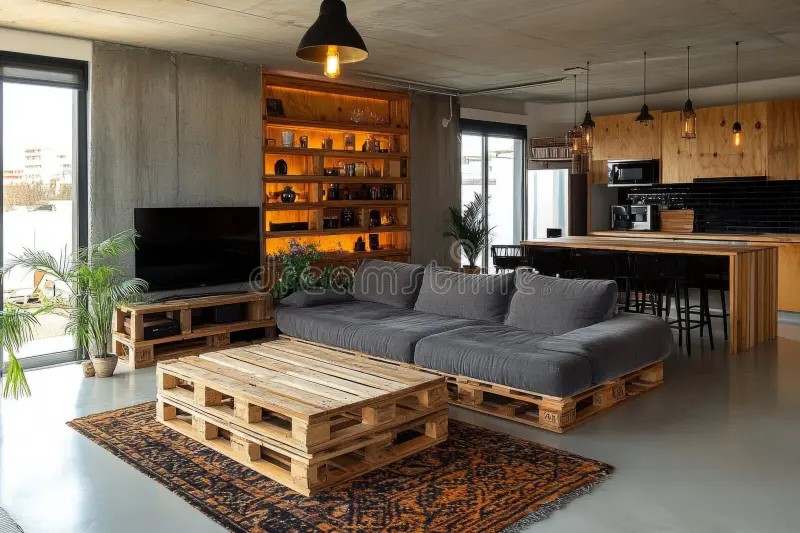
<script type="application/ld+json">
{
"@context": "https://schema.org",
"@type": "BlogPosting",
"mainEntityOfPage": {
"@type": "WebPage",
"@id": "https://homesnhouses.com/steampunk-style-home-decor/"
},
"headline": "Steampunk Style Home Décor-2025",
"image": "https://homesnhouses.com/wp-content/uploads/2025/03/Futuristic-Design.jpg",
"author": {
"@type": "Person",
"name": "homesnhouses.com",
"url": "https://homesnhouses.com/"
},
"publisher": {
"@type": "Organization",
"name": "https://homesnhouses.com/steampunk-style-home-decor/",
"logo": {
"@type": "ImageObject",
"url": "https://homesnhouses.com/wp-content/uploads/2025/03/Steampunk-Style-Home-Decor-1.jpg"
}
},
"datePublished": ""
}
</script>